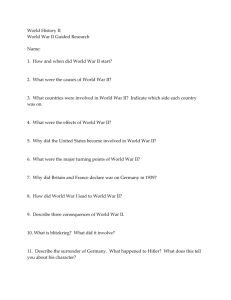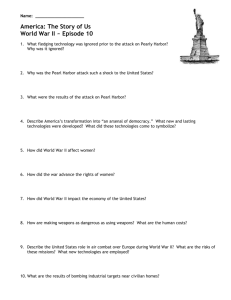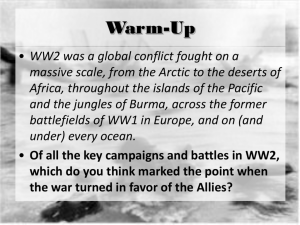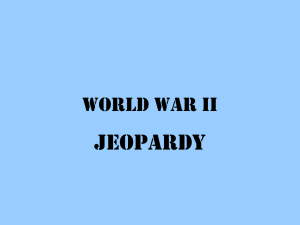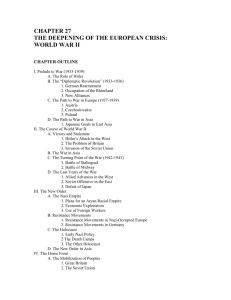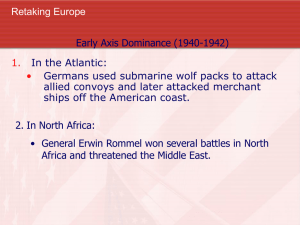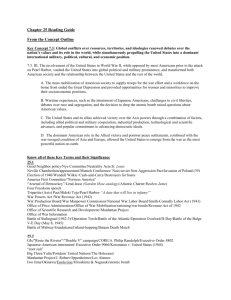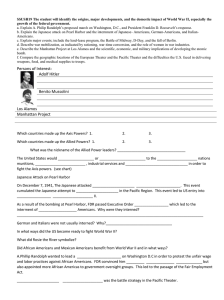WWII game cards
advertisement
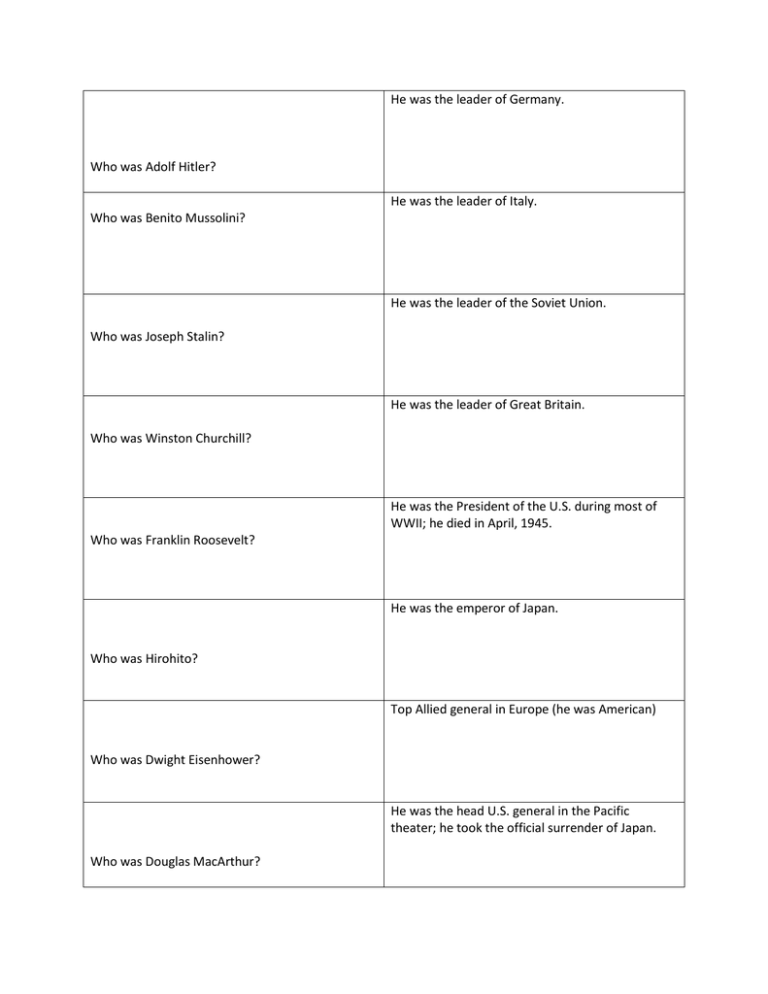
He was the leader of Germany. Who was Adolf Hitler? He was the leader of Italy. Who was Benito Mussolini? He was the leader of the Soviet Union. Who was Joseph Stalin? He was the leader of Great Britain. Who was Winston Churchill? He was the President of the U.S. during most of WWII; he died in April, 1945. Who was Franklin Roosevelt? He was the emperor of Japan. Who was Hirohito? Top Allied general in Europe (he was American) Who was Dwight Eisenhower? He was the head U.S. general in the Pacific theater; he took the official surrender of Japan. Who was Douglas MacArthur? He became president at the end of the war; he gave the order to drop the atomic bombs. Who was Harry Truman? What was the Potsdam Conference? Meeting between the U.S, Great Britain, and the Soviet Union in July 1945 in Germany. Soviets showed that they were not going to allow free election in Eastern Europe; started tensions between U.S. and Soviet Union. Hitler's political group that took control of Germany. Define: Nazi A political philosophy that advocated a strong, centralized, nationalistic government headed by a powerful dictator. Define: Fascism A totalitarian system of government where a single authoritarian party controls state owed means of production. Define: Communism Define: Blitzkrieg "Lightning War"; fast moving warfare that utilized tanks and planes; used by the Germans in the early years of the war. The German Air Force Define: Luftwaffe The murder of 12 million people (6 million Jews) carried out by Nazi Germany. Define: Holocaust The extermination of a racial, religious, or ethnic group. Define: Genocide This was the largest death camp, where around 3 million were killed during the Holocaust. Define: Auschwitz Operation Overlord: June 6, 1944 Allied invasion of Normandy, France. Define: D-Day Germany's last offensive; occurred December 1944; won by Allies What was the Battle of the Bulge? Turning point in Europe after this battle; the Soviets began to push Germany back What was the Battle of Stalingrad? It was attacked on December 7, 1941; when Japanese attacked it, U.S. joined the war. Define: Pearl Harbor Turning point in the Pacific; at the battle, the U.S sunk four Japanese aircraft carriers. Define: Battle of Midway Define: Kamikaze Suicide Japanese pilots who tried to crash into U.S. ships; war tactic This was where the first atomic bomb was dropped. (Little Boy. August 6, 1945) Define: Hiroshima This was where the second atomic bomb was dropped. (Fat Man. August 9, 1945) Define: Nagasaki Met in 1946 to punish those responsible for the Holocaust Define: Numberg Trials This world peace organization was created after WWII and is still in existence. Define: United Nations Meeting between Roosevelt, Churchill, and Stalin in early 1945. They met to discuss the post-war world. Define: Yalta Conference Germany, Italy, Japan Who were the three main Axis Powers? U.S, Great Britain, Soviet Union Who were the three main Allied Powers? Because Germany invaded Poland Why did World War II start in Europe? Why did Japan attack Pearl Harbor? Because the U.S was Japan's only threat in the region; Japan though a sneak attack would destroy the U.S Navy and make the U.S powerless Though they did not like the Axis powers, most Americans were against actually fighting them. Before Pearl Harbor, how did most Americans feel about joining the war? Japan wanted Asia's resources Why did Japan begin to conquer Asia? China The main fighting in Asia began when Japan invaded what country? Island hopping What strategy did the U.S. use to defeat Japan? To end the war sooner and to save Allied lives. Why did the United States drop two atomic bombs on Japan? Germany invaded them in 1941 Why did the Soviet Union join the war? Around 55 million About how many people died because of World War II? 11 million How many people were murdered in the Holocaust? How did World War II affect the lives of civilians? Millions were killed and wounded; those who weren't killed had to make sacrifices for the war effort. The U.S. wanted to use the island as a base for bombers to reach Japan; U.S. was successful. Define: Battle of Iwo Jima The island was the last obstacle that stood between the Allies and the final assault on Japan; Japanese used kamikaze attacks; the U.S. won Define: Battle of Okinawa Hiroshima The first atomic bomb used against Japan was dropped on Charles de Gaulle ruler of French government in exile; returned to France after Paris was liberated submitted to Hitler's demands In following a policy of appeasement, what did Britain and France do? the Soviet Union Which nation signed a non-aggression pact with Germany that led to the invasion of Poland? end the war and save American lives Truman's aim in deciding to drop the atomic bomb was to surprise and overwhelming force On what did the German military strategy of blitzkrieg depend? D-Day The Allied invasion of France to free western Europe from the Nazis was known as before the war began When did Britain and France adopt a policy of appeasement toward Germany? Jews Which group of people suffered 6 million deaths during the Holocaust? Britain This nation won the Battle of Britain. the deliberate extermination of a specific group of people What is genocide, as practiced by the Nazis? January 30, 1933 When does Hitler come to power in Germany March 4, 1933 When does FDR become president? September 1, 1939 When did Germany invade Poland to begin World War II What is D-Day? Invasion of Normandy France by Allied Forces opens a second/western front against Germany. attacked by Japan – leading immediately to America’s entry into WWII. Who attacked Pearl Harbor and which country entered the war because of it? celebrates the fall of Germany and the end of the war in Europe. What is VE-Day? Aug 6th 1945 When was the atomic bomb is dropped on Hiroshima, Japan? celebrates the official end of WWII. What is VJ-Day? August 15, 1945 When was VJ day? May 8, 1945 When was VE day? June 6, 1944 When was D-Day? December 7, 1941 When was Pearl Harbor? 6 million How many Jews were killed in the Holocaust? 5 million How many non-Jews were killed in the Holocaust?
